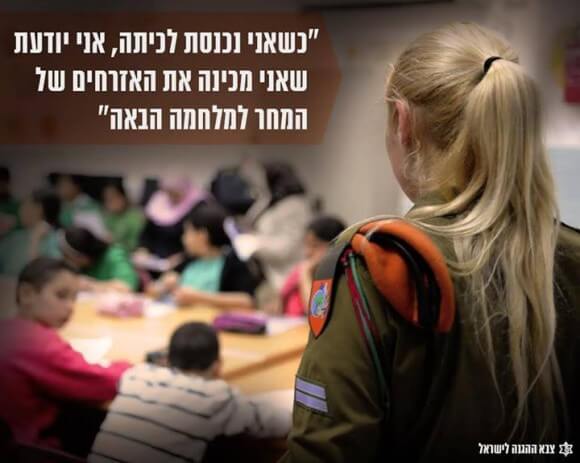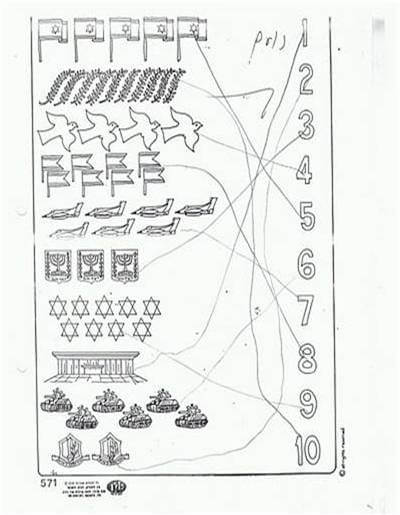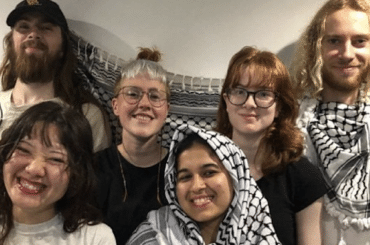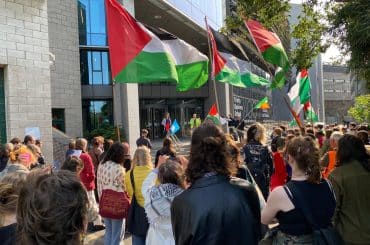We received the following two pieces, the Israel Arts and Science Academy (IASA) Alumni & Students’ Military Refusal Letter and Press Release, “In memory of those massacred six years ago in the besieged Gaza Strip.” The Cast Lead offensive began on Dec. 27, 2008.
Over fifty alumni, former educators and staff members of the Israel Arts and Science Academy, Jews and Palestinians, have published a letter calling the high-school community – students and alumni alike – to refuse service in the Israeli military.

2014 was marked by outright violence and racism against Palestinians, both in Israeli politics and within Israeli society. At the same time, some critical voices who call on refusing to serve the oppressive system were also heard – this letter is the fourth of its kind to be published this year. However, it is unique in that both Israeli Jews and Palestinians have formulated and signed it, and by insisting on making an explicit call for refusal – which risks severe punishment under Israeli law.

The letter and website emphasize the role of the Israeli educational system in indoctrinating and preparing youth for military service, as well as the role of societal expectations: “The refusal to serve means also resisting the militaristic indoctrination process we all went through since our childhood in schools, youth movements, national ceremonies, in high school – and which continues in our adult lives.”
Last year, current students at the school led an internal struggle for the direct employment under fair conditions for the cleaning, kitchen and maintenance staff of the institution. Now, the alumni are continuing to press for social and political change: “Our human and civil duty is to be involved in our society and fix it. Refusal means voting with our feet against a policy that cannot be tolerated… Oppression mechanisms are also used against Jews within Israel, particularly against Mizrachi, Ultra-Orthodox, Ethiopians, women, residents of the periphery and the poor wherever they are. The military is not the only executive power in the current political, social and economic reality, but a refusal to serve in it is a clear expression of resistance against these oppressions.”
Gabi Wolff, himself a conscientious objector and a signatory to the letter: “At seventeen I decided that I will not serve in the military. That I will not take part in the occupation. That I will not lend a hand to the continued control over another people. Today, more than a decade after being released from prison, I call on others to avoid being recruited, exactly because of my concern for Israeli society. The poverty in Israel, the lack of funding for culture, the violence, the taking apart of the welfare state, the destruction of academic freedom – are all made possible because of the occupation and the eternal sense of fear it generates.”
The Israel Arts and Science Academy was founded in 1990 by the Israeli Center for Excellence through Education, as a high school and boarding school for gifted and outstanding students from all over the country. The high school receives applications from a variety of populations in Israel: secular and religious, Jews, Muslims, Druze and Christians. “The Israel Arts and Science Academy accepts students from various backgrounds, with different religions and diverse national identities. It is only natural for those who experienced the ideal of living in a multicultural community not to reject it by serving in a military whose purpose is maintaining separation,” says Noa Abend, an alumnus.
The letter’s signatories call on their fellow alumni, present and future, to join the call and actively refuse Israeli occupation and apartheid. The initial list of signatories constitutes an unusually high number, especially when coming from a small single institute.
The following letter is published in Hebrew , Arabic, and English:
A Call on IASA Alumni to Refuse Mandatory and Reserve Duty Service in the Israeli Military
We, Israel Arts and Science Academy alumni, former staff members, Palestinians and Jews, from different ages and diverse world-views, approach you, alumni and future alumni – dare to refuse.
As human beings and citizens we each carry responsibility for our choices and actions. Military service or refusing it is a choice. Refusing to serve in the Israeli military is not an easy choice, but a moral stance against a collective mood manifested in racism and violence on every street these days. It is a choice to withstand the pressure coming from one’s home, friends, professional environment and the media, and to not take part in the crimes done in our name. The refusal to serve means also resisting the militaristic indoctrination process we all went through since our childhood in schools, youth movements, national ceremonies, in high school – and which continues in our adult lives.
The Israeli military is responsible for the mundane systematic mechanisms of oppression used against Palestinians in the Occupied Territories while also taking part in the oppression and dispossession of the non-Jewish citizens of the State of Israel. The military serves as an enabler to a separation-regime based on the notion of an ethnic superiority of Jews over Palestinians; a regime which denies basic human rights, enforces separate legal systems to different populations in the West Bank, and which has institutionalized a system of ethnic-based discrimination in the ‘48 territory.
The fundamental questions surrounding military service are frequently silenced by equating refusing to serve with an opposition to the very existence of the state, deeming it therefore an irresponsible act which endangers our very physical existence. And we say to you: this is a demagogic silencing of your sense of justice and reason. Our human and civil duty is to be involved in our society and fix it. Refusal means voting with our feet against a policy that cannot be tolerated. Under a regime which negates any chance for diplomatic and social normalcy, which can ignore and squash sweeping social protest, refusal today is a brave and necessary act of civil resistance to unacceptable crimes. Today, after the most recent massacre in Gaza, a horror committed in our name against nearly two million people – half of whom are children and teenagers – we choose not to remain silent.
Oppression mechanisms are also used against Jews within Israel, particularly against Mizrachi, Ultra-Orthodox, Ethiopians, women, residents of the periphery and the poor wherever they are. The military is not the only executive power in the current political, social and economic reality, but a refusal to serve in it is a clear expression of resistance against these oppressions. Backed by the military, Israeli governments are exploiting the weakened populations for ethnic cleansing and dispossession projects across the Green Line, in the Negev and the Galilee, using them to fight the so called “demographic war”. The constant state of emergency serves the destructive neoliberal policy of the regime, which means the state’s rejection of its responsibility for its own citizens while eroding basic services such as health, welfare and education.
Refusing to serve is a privilege, demanding a difficult grappling with society, with the community and family, and sometimes even serving time in a military prison. When we were teenagers some of us did not have the knowledge, the courage or the proper networks of support to allow such an act, and we want you to know that there are voices like ours as well as different frameworks that support those who refuse or consider refusing.
You, the current students at the school, have led an inspiring struggle last year, aimed at improving the working conditions of contract workers there. This is one example of many effective forms of resistance to oppressive policies. Similarly, we believe that resistance by individuals through a refusal to serve the system can bring about a fundamental change in society and promote a social structure which is not based on the control of Jews over non-Jews in Israel.
From its inception to this day, the school’s administration boasts about the high quality of its education for leadership and excellence. Therefore, taking personal responsibility on your part and refusing Israel’s policy is all the more important. Use the critical tools and the rare experience of living in a school which brings together people from diverse ethnic groups and backgrounds to impact the society and the state in a positive way.
Yours,
Raya Rotem, former IASA teacher of literature, war widow
Nitzan Ofir, class of 1993
Natalie Rothman, class of 1994
Ronnie Barkan, class of 1994
Anonymous, class of 1994
Aluma Klein, class of 1995
Fadi Shbita, class of 1995
Dana Abta, class of 1996, former IASA teacher of arts
Gilad Leibovich, class of 1996, former IASA class counselor
Ayelet McKyton, class of 1996, student thesis advisor
Rafi Avigad, class of 1996
Anonymous, class of 1996
Ghada Bshara, class of 1996
Assaf Mahalalel, class of 1996
Anonymous, class of 1996
Anonymous, class of 1996
Mamdooh Afdile, class of 1998
Maya Maxwell, class of 1998
Udi Greenberg, class of 1998
Anonymous, class of 1998
Manal Ammouri, class of 2000
Danielle Shwartz, class of 2000
Gabriel Wolff, class of 2000
Odelia Hitron, class of 2001
Erga Sonnenberg, class of 2001
Saab Mansour, class of 2001
Amit Gilutz, class of 2001
Avital Reshef, class of 2001
Hana Amori, class of 2001
Yael Ben-gigi, class of 2001
Liron Mor, class of 2001
Nir Baruch, class of 2001
Anonymous, class of 2001
Anonymous, class of 2001
Anonymous, class of 2001
Ela Gringauz, class of 2002
Jethro Brice, class of 2002
Ariel Yehuda Yahav, class of 2002
Noa Abend, class of 2002
Maisalon Dallashi, class of 2004
Adel Naamneh, class of 2004
Mai Sulieman, class of 2004
Eva Falah, class of 2004
Roi Hendel, class of 2004
Timna Raz, class of 2004
Inbal Djamchid, class of 2005
Yoni Balaban, class of 2005
Anonymous, class of 2005
Anonymous, class of 2005
Anonymous, class of 2005
Abed Shalabi, class of 2009
Anonymous, class of 2010
Anonymous, class of 2012
—
** Since the act of conscientious objection is regarded in a very negative way in the society we live in, some of us could not afford to expose their name at work, school or with the family and have therefore chosen to sign anonymously.
To join or for any consultation please contact: info@iasa-refuse.org or use the contact form.




“Okay, kids, how many tanks do you see in this picture? Now, how many fighter jets? How many doves and menorahs?”
War is peace.
A brave statement. It shouldn’t take being “gifted” to see the indoctrination for what it is. Congratulations, anyway, on seeing through it.
A small but very brave action in today’s climate. Particularly in Israel with right wing goons and gangs known to physically attack individuals.
I’d love to see that world wide.
Heaven has a place for these thinking & wonderful people.
There’s always been a choice.
Thank you, Ronnie Barkan et al.